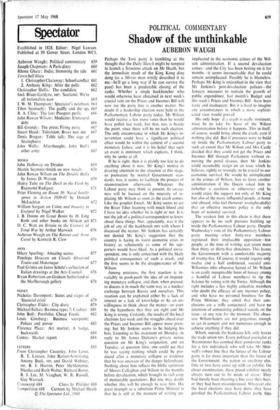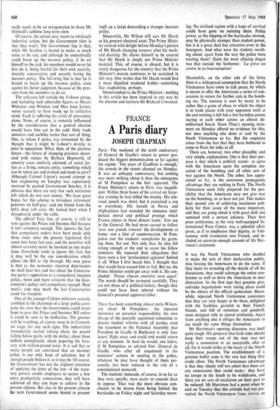Shadow of the unthinkable
POLITICAL COMMENTARY AUBERON WAUGH
Perhaps the Tory party is trembling at the thought that the Daily Sketch might be tempted to launch a ferocious attack on Mr Heath, but the immediate result of the King Kong ding dong (as a Mirror man wittily described it to me—he'll go a long way if he can survive the pace) has been a predictable closing of the ranks. Whether a single backbencher who would otherwise have abstained in next week's crucial vote on the Prices and Incomes Bill will now toe the party line is another matter. No doubt if a leadership election were beld in the Parliamentary Labour party today, 11r Wilson would receive a few more votes than he would have polled last week, but that, too, is beside the point, since there will be no such election. The only circumstance in which Mr King's in- tervention could have a significant political effect would be within the context of a second monetary failure, and it is his belief that such an event is imminent which explains, I think.
why he spoke at all. •
If he is right, then it is plainly too late to do anything about it now. Mr King's motive in drawing attention to the situation at this stage. so premature by normal Government stan- dards, was, it seems, to facilitate the process of reconstruction afterwards. Whatever the Labour party may think at present, its aware- ness will be focused on the necessity of re- placing Mr Wilson as soon as the crash comes. Like the prophet Enoch, Mr King seems to see the River Tiber foaming with much blood and I have no idea whether he is right or not. It is not the job of a political correspondent to know about these things. Nor, apparently, was it the job of any of the backbench MPS with whom I discussed the matter. Mr Jenkins has certainly not denied Mr King's suggestion that the country is facing its worst economic crisis in history as vehemently as some of his sup- porters would have liked. As a political corre- spondent, one is only concerned with the likely political consequences of such a crash, and the first seems to be the disappearance of Mr Wilson.
Among ministers, the first reaction is in- variably to pooh-pooh the idea of an impend- ing monetary collapse, and then, when pressed. to discuss it in much the same way as a nuclear exchange between Russia and ourselves. This reaction can be explained either by a lack of interest or a lack of knowledge or by an un- willingness to think about the matter—or even by the hypothesis that they are right and Mr King is wrong. Certainly, the results of the local elections last week and the struggles ahead over the Prices and Incomes Bill appear more press- ing; but Mr Jenkins seems to be hedging his bets. Listening to his statement on Monday, in reply to Mr James Dickens's private notice question on Mr King's resignation, and on Tuesday, at question time, one could see that he was saying nothing which could be pro- duced after a monetary collapse as evidence that he was unaware of the danger beforehand. Nothing about him reflects the blithe optimism of Messrs Callaghan and Wilson in the months before devaluation, which brought its rich crop of memorable quotations. But one may doubt whether this will be enough to save him. His great strength as a substitute Prime Minister is that he is still at the moment of writing un- implicated in the economic crimes of the Wil- son administration. If a second devaluation comes—and the City has been betting on it for months—it seems inconceivable that he could remain unimplicated. Possibly he is blameless. Perhaps Mr King is unjustified in the view that Mr Jenkins's post-devaluation policies—the January measures to restrain the growth of public expenditure, last month's Budget and this week's Prices and Incomes Bill--have been tardy and inadequate. But it is hard to imagine any circumstances in which a more sophisti- cated view would prevail.
His only hope if a crash is really imminent, must be to take his leave of the Wilson administration before it happens. This in itself, of course, would bring about the crash, even if nothing else did. But if pressures were to build up inside the Parliamentary Labour party to such an extent that Mr Wilson and Mrs Castle decided that they could not get the Prices and Incomes Bill through Parliament without 're- moving the penal clauses, then Mr Jenkins could reasonably resign on an issue which he believes, rightly or wrongly, to be crucial to our economic survival. He would be unimplicated in the crimes of Wilson, free to form another administration if 'the Queen asked him to (whether a coalition or otherwise) and he would enjoy the support not only of Mr King but also of the many influential people, at home and abroad, who feel (however wrongheadedly) that an effective incomes policy is the only hope of national survival.
The weakest link in this chain is that there appears to be no such pressure building up inside the Parliamentary Labour party. Despite Wednesday's vote of the Parliamentary Labour party meeting--when forty-two members registered their implacable opposition—few people, at the time of writing, can count more than thirty or thirty-five abstainers. This leaves the Government with a comfortable majority of twenty-five. Of course, it would require only twelve and a half embittered, suicidal anti- Wilsonites (this obsessive hatred of Mr Wilson is an easily recognisable form of lunacy among a handful of Labour members) to tip the balance by voting with the Tories. Although the right includes a few highly articulate members who doubt the efficacy of any incomes policy, and who have no personal fondness for the Prime Minister, they admit that their con- clusions are a trifle conjectural, and have no intention of committing political suicide on the issue—at any rate for the moment. The obses- sive Wilson-haters are not gregarious enough to act in concert and not numerous enough to achieve anything if they did.
Which, outside the hard-core left. only leaves the trade union MPs. Every political journalist at Westminster has combed their ponderous ranks for a few individuals who will take Mr Shin- well's robust line that the future of the Labour party is far more important than the future of the Government, the nation or anything else. One or two have come up with an exhibit. On closer examination, these proud exhibits nearly always turn out to be made of straw. They had merely been shooting a line over their beer, or they had been misunderstood. Whatever else the local elections may have done, they have petrified the Parliamentary Labour party. One really needs to be an octogenarian to share Mr Shinwell's sublime long-term view.
Of course, the unions may resort to wholesale industrial action, but the Government view is that they won't. The Government line is that, while Mr Scanlon is bound to make as much noise as he can, and although be undoubtedly could break up the incomes policy, if he set himself to the task, his members would never let him do it, being fearful for their own security, innately conservative and secretly loving the incomes policy. The left-wing line is that he is bound to break up the incomes policy, even against his better judgment, because of the pres- sure from his members to do so.
The soft-core left outside the Tribune group, and including such admirable figures as Messrs Whitaker and Winnick and Miss Joan Lestor, seems scarcely to have made up its collective mind. Each is suffering his crisis of conscience alone. None, of course, is remotely influenced by the consideration that a general election would leave him out in the cold. Only trade unionists and suchlike notice that sort of thing. One, to whom I spoke, was tormented by the thought that it might be Labour's destiny to exist in opposition. What, then, of the glorious future—the future of shopping precincts decor- ated with statues by Barbara Hepworth, of amenity areas similarly adorned, of social jus- tice as a living, sensate entity, something which can be taken out and stroked and made to purr? Although Colonel Lipton's second attempt to ban staghunting on Tuesday was rapturously received by packed Government benches, it is obvious that there are very few such initiatives left which do not cost money. 'We have great hopes for this scheme to introduce retirement pensions on half-pay,' said my friend from the left's deep soft core. He looked hurt when I disappeared under the table.
The official Tory line, of course, is still to vote against the Prices and Incomes Bill because it isn't voluntary enough. This ignores the fact that compulsory orders have been made only three times since the present legislation first came into force last year, and the penalties will almost certainly never be invoked on any major issue. Everybody tends to ignore this fact, but it may well be the one consideration which allows the Bill to slip through. My own guess is that as the economic situation deteriorates we shall hear less and less about the Conserva- tive party's opposition to a compulsory incomes policy, more and more criticism that the Gov- ernment's policy isn't compulsory enough. Next week's vote may mark the last Conservative stand for freedom.
One of the younger Cabinet ministers recently confided in the chairman of a large public com- pany his view that the Government could never hope to pass this Prices and Incomes Bill unless it could be seen to be ineffective. The gnomes will be watching, of course, even in its Commit- tee stage, for any such signs. The industrialist immediately started talking about the pound falling below parity with the dollar, about three million unemployed, about papering his lava- tory with million-pound notes. It is sad that so many people are convinced that an incomes policy is our only hope of salvation, but if enough people believe it, so it may be. Of course, the Government has not the slightest intention of applying the letter of the law—if the statu- tory powers enable employers to secure a few extra productivity concessions, they will have achieved all they can hope to achieve in the present climate. But also in the present climate the next Government seems bound to present itself on a 'ticket demanding a stronger incomes policy Meanwhile, Mr Wilson still sees Mr Heath as his greatest electoral asset. The Prime Minis- ter crowed with delight before Monday's picture of Mr Heath changing trousers after his week- end ducking. He allows himself to be assured that Mr Heath is simply not Prime Minister material. This, of course, is absurd; but it is surely dangerous for the country that the Prime Minister's morale continues to be sustained in this way. One wishes that Mr Heath would find a more dignified weekend hobby—something like staghunting, perhaps.
Memorandum to the Prime Minister: nothing in this article has been inspired in any way by the discreet and taciturn Mr Richard Crossman.







































 Previous page
Previous page